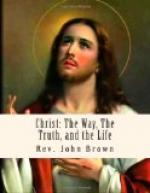3. Through carelessness, in not adverting at first to the beginnings and first degrees of this deadness and upsitting, when the heart beginneth to grow formal and superficial in duties, and to be satisfied with a perfunctorious performance, without life and sense.
4. Through torturing of conscience, in light and smaller matters; for this may provoke God to let conscience fall asleep, and so the soul become more untender, and scruple little, at length, at great matters; and thus deadness may come to a height, God ordering it so, for a further punishment to them, for their untenderness and uncircumspectness.
5. Through their not stirring up themselves, and shaking off that spirit of laziness and drowsiness, when it first seizeth upon them; but, with the sluggard, yet another slumber, and another sleep, and a folding of the hands to sleep.
6. Continuing in some known sin, and not repenting of it, may bring on this distemper, as may be observed in David.
As to the second particular, Christ is life to the soul in this case; in that,
1. He keepeth possession of the soul; for the seed remaineth, the root abideth fast in the ground; there is life still at the heart, though the man make no motion, like one in a deep sleep, or in a swoon, yet life is not away.
2. He in due time awakeneth, and rouseth up the soul, and so recovereth it out of that condition, by some means or other, either by some alarm of judgment and terror, as he did David; or dispensation of mercy and tenderness, as he did Peter; and usually he recovereth the soul,
(1.) By discovering something of this condition, by giving so much sense and knowledge, and sending so much light, as will let the soul see that it is not well, and that it is under that distemper of lifelessness.
(2.) By the discovering the dreadfulness of such a condition, and how hazardous it is to continue therein.
(3.) By putting the soul in mind, that he is the life and the resurrection; and through the stirring up of grace, causing the soul to look to him for quickening and outgate.
(4.) By raising up the soul at length out of that drowsiness, and sluggish folding of the hands to sleep, and out of that deep security, and putting it into a more lively, vigilant, and active frame.
As to the third, the believer that would make use of Christ, for a recovery out of this condition, would mind those duties:
1. He would look to Christ, as the light of men, and the enlightener of the blind; to the end, he may get a better and a more thorough discovery of his condition; for it is half health here to be sensible of this disease. The soul that is once brought to sense, is half recovered of this fever and lethargy.
2. He would eye Christ as God, able to cause the dead and dry bones to live, as Ezek. chap. xxvii.; and this will keep from despondency and despair; yea, it will make the poor believer conceive hope, when he seeth that his physician is God, to whom nothing is impossible.




